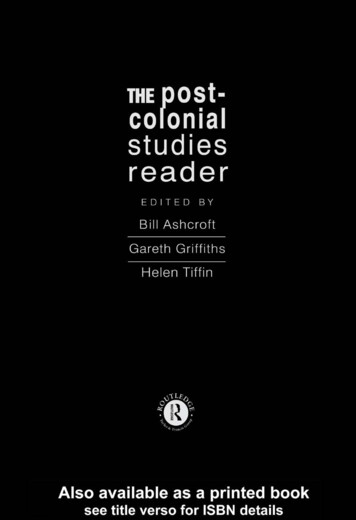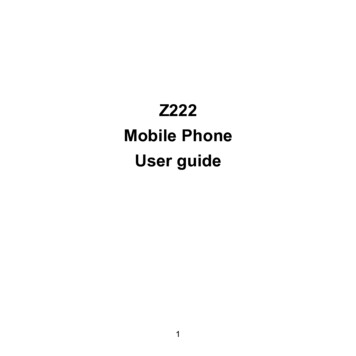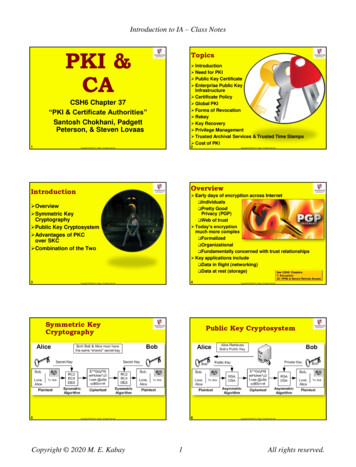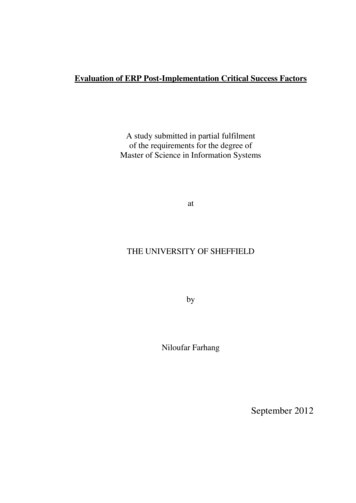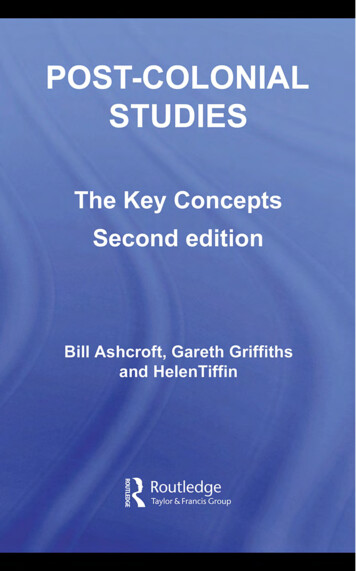
Transcription
POST-COLONIAL STUDIES‘Not quite a dictionary but an invaluable reference tool nonetheless, its identification of key terms remains as useful as its definitions of those terms.’Professor Antoinette Burton, University of IllinoisThis best-selling key guide, now in its second edition, provides anessential key to understanding the issues which characterize postcolonialism, explaining what it is, where it is encountered and why itis crucial in forging new cultural identities. As a subject, post-colonialstudies stands at the intersection of debates about race, colonialism,gender, politics and language. Key topics covered include: borderlandstransnational m.Post-Colonial Studies: The Key Concepts is fully updated and crossreferenced throughout. With additional further reading this book haseverything necessary for students and anyone keen to learn moreabout this fascinating subject.Bill Ashcroft teaches at the University of Hong Kong and theUniversity of NSW, Gareth Griffiths at the University of WesternAustralia and Helen Tiffin at Queen’s University, Canada. They arethe editors of The Post-Colonial Studies Reader and the authors ofThe Empire Writes Back, both published by Routledge.
POST-COLONIALSTUDIESThe Key ConceptsSecond editionBill Ashcroft, Gareth Griffithsand Helen Tiffin
First published 2000by Routledge2 Park Square, Milton Park,Abingdon, Oxon, OX14 4RNSecond edition published 2007Simultaneously published in the USA and Canadaby Routledge270 Madison Avenue, New York, NY 10016This edition published in the Taylor & Francis e-Library, 2007.“To purchase your own copy of this or any of Taylor & Francis or Routledge’scollection of thousands of eBooks please go to www.eBookstore.tandf.co.uk.”Routledge is an imprint of the Taylor & Francis Group, an informa business 2000, 2007 Bill Ashcroft, Gareth Griffiths and Helen TiffinAll rights reserved. No part of this book may be reprinted orreproduced or utilised in any form or by any electronic, mechanical,or other means, now known or hereafter invented, includingphotocopying and recording, or in any information storageor retrieval system, without permission in writingfrom the publishers.British Library Cataloguing in Publication DataA catalogue record for this book is available from the British LibraryLibrary of Congress Cataloging in Publication DataAshcroft, Bill, 1946Post colonial studies : the key concepts / Bill Ashcroft,Gareth Griffiths & Helen Tiffin. – 2nd ed.p. cm.Previous ed. published under title: Key concepts in post-colonial studies.“Simultaneously published in the USA and Canada by Routledge.”Includes bibliographical references and index.1. Colonies–Dictionaries. 2. Decolonization–Dictionaries.3. Postcolonialism–Dictionaries. 4. Ethnic attitudes–Dictionaries.5. Race relations–Dictionaries. I. Griffiths, Gareth, 1943– II. Tiffin, Helen.III. Ashcroft, Bill, 1946– . Key concepts in post-colonial studies. IV. Title.JV22.A84 2008325’.303—dc222007018708ISBN 0-203-93347-8 Master e-book ISBNISBN10: 0–415–42856–4 (hbk)ISBN10: 0–415–42855–6 (pbk)ISBN10: 0–203–44997–5 (ebk)ISBN13: 978–0–415–42856–9 (hbk)ISBN13: 978–0–415–42855–2 (pbk)ISBN13: 978–0–203–44997–4 (ebk)
CONTENTSIntroduction to the second editionList of Key ConceptsviixiKEY CONCEPTS1BibliographyName IndexSubject Index227281287v
INTRODUCTION TO THESECOND EDITIONSince the publication of Post-Colonial Studies nearly ten years ago thesubject has expanded and diversified both in its impact and significance,in fields as varied as globalization, environmentalism, transnationalism, the sacred, and even economics, through the significance of thespread of neo-liberalism. The controversies in the field, particularly,circulating around the term ‘post-colonial/postcolonial’ itself continueunabated, but the relevance of neo-imperialism and the issues emerging from the engagements of post-colonized societies in a ‘glocal’ agehave demonstrated the usefulness of post-colonial analysis. From theperspective of this decade it is possible to look back at the 1990s andsee how important the humanities in general and post-colonialdiscourse in particular were to developing a new language to addressthe problems of global culture and the relationships between localcultures and global forces. This occurred because the classical narrativesof Modernity in which social theory was mired – dependency theoryand centre–periphery models – were unable to explain the multidirectional flow of global exchanges, a flow that was most noticeablein cultural exchange. One significant example of this multi-directionalflow is the phenomenon of the Black Atlantic, which reveals theamazing complexity and productivity of African cultures in theAtlantic. The history of such flows reveals that the multi-directionaland transcultural nature of global culture is not a new phenomenon.Many of the issues and problems surrounding the topic of globalization (the place of the ‘glocal’; the function of local agency under thepressure of global forces; the role of imperialism in globalization; theconnection between imperialism and neoliberal economics) areaddressed, and continue to be addressed by the post-colonial analysis ofimperial power. Thus, although we need to be careful about falselyprescribing post-colonial theory as a panacea, and should keep in mindthe firm grounding of post-colonial discourse in the historicalvii
INTRODUCTION TO THE SECOND EDITIONphenomenon of colonialism, the field of post-colonial studies hasprovided useful strategies for a wider field of global analysis. Postcolonial literary and cultural production in particular has demonstrated the insistent reality of local agency, an agency that can addresssimple dualistic approaches to the local and global.One of the most persistent and controversial topics of contemporary politics is the issue of the environment. Global warminghas demonstrated the devastating effects of the industrial revolutionand the unfettered pursuit of capital expansion. The environment,and attendant topics such as ecofeminism, ecological imperialism,environmentalism, speciesism have all taken an increasingly prominentplace in post-colonial thought because it has become clear that thereis a direct connection between colonialist treatment of indigenousflora and fauna and treatment of colonized and otherwise dominatedsubjects and societies. The devastation of colonized place (and potentially of the planet) paved the way for the devastation of societies. Untilnow the destruction of the physical and human environments havebecome the same thing.Increasingly, post-colonial theory has been found useful in examining a variety of colonial relationship beyond the classic colonizingactivities of the British Empire. The concept of boundaries and bordershas been crucial in the imperial occupation and domination of indigenous space. And the question of borders and borderlands has nowbecome a pressing issue in an age of increasingly hysterical border protection. Cultural borders are becoming recognized as a critical regionof colonial and neo-colonial domination, of cultural erosion, and ofclass and economic marginalization. The field of post-colonial studiesnow includes the vexed subjects of contemporary neo-colonialism: theidentities and relationships of Chicano, Latino and hybrid subjectivitiesof various kinds. These subjects, who slip between the boundaries ofthe grand narratives of history and nation, are becoming an increasingly important constituency for post-colonial studies.Another issue that has become more prominent, because morecomplex than previously regarded, is the issue of the sacred. Religion,the impact of missions and the nature and function of a ‘post-colonialsacred’ are becoming increasingly prevalent in what some refer toas a ‘post-secular age’. There can be no doubt that the aggressivearticulation of religious dogma, the failure of dialogue and the increasingly polarized globe have offered unprecedented global dangers. Butthese realities also offer opportunities for an analysis of the kinds ofcomplex hybridized developments of the sacred that have beenrevealed by post-colonial analysis.viii
INTRODUCTION TO THE SECOND EDITIONOne of the terms emerging from post-colonial studies seems tocircumvent some of the perceived problems inherent in descriptionssuch as ‘post-colonial’ and diaspora. ‘Transnational’ as an adjectiveis growing in use since it extends to migrant, diasporic and refugeecommunities not directly emerging from the colonial experience.The increasing flow of populations, the mobility of individuals, theincreased crossing of borders and the blurring of the concept of‘home’ have produced a range of transnational literatures and otherforms of cultural production that extend the field of the post-colonialin productive ways.Some more familiar terms in post-colonial studies have beenincluded in this second edition, such as ‘double colonization’, ‘firstnations’ and ‘translation’. Others, such as ‘whiteness’ have alreadyblossomed into a virtual field of their own. Many of these terms arecentral to post-colonial studies, others are shared with other fieldsof study; some, like ‘race’ are broader than post-colonial studies itself.But all the words in this Key Concepts will be used at some stage inthe field and will be useful for students and writers as they engage thisincreasingly vibrant field.ix
LIST OF KEY CONCEPTSAboriginal/indigenous peoplesAbrogationAfrican American andpost-colonial BinarismBlack AtlanticBlack bean/West IndianCartographyCatachresisCatalysisCentre/margin (periphery)ChromatismClass and post-colonialismColonial desireColonial discourseColonial patronageColonialismCommonwealthCommonwealth LiteratureCompradorContact zoneContrapuntal diversity/culturaldifferenceCultural tourismDecolonizationDependency theoryDeracinateDiasporaDiscourseDislocationDouble colonizationEcofeminismEcological ismxi
LIST OF KEY CONCEPTSExploration and travelFanonismFeminism and post-colonialismFiliation/affiliationFirst nationsFrontierGlobalizationGlocalization‘Going native’HegemonyHybridityImperialismIndentured labourIndependenceInterpellationLiminalityMagic �tisseMetonymic gapMetropolis/metropolitanMiddle PassageMimicryMiscegenationMissions and colonialismModernism and post-colonialismModernityMulattoMultitudeNation languageNation/nationalismNational allegoryNational liberation eo-imperialismNeo-liberalismNew stPidgins/creolesPlacePost-colonial bodyPost-colonialism/PostcolonialismPost-colonial readingPost-colonial on and the post-colonialRhizomeSavage/civilizedSettlerSettler rd World (First, Second,Fourth)TransculturationTransnational hington ConsensusWhitenessWorld system theoryWorldingxii
POST-COLONIAL STUDIES
ABROGATIONABORIGINAL/INDIGENOUS PEOPLESIndigenous peoples are those ‘born in a place or region’ (OED). Theterm ‘aboriginal’ was coined as early as 1667 to describe the indigenousinhabitants of places encountered by European explorers, adventurersor seamen. While the terms ‘aboriginal’ and ‘aborigine’ have beenused from time to time to describe the indigenous inhabitants of manysettler colonies, they are now most frequently used as a shortenedform of ‘Australian Aborigine’ to describe the indigenous inhabitantsof Australia. The adjective ‘aboriginal’ has been more frequently usedas the generic noun in recent times, the term ‘aborigine’ beingconsidered by many to be too burdened with derogatory associations.Furthermore, the feeling that the term fails to distinguish and discriminate among the great variety of peoples who were lumped togethergenerically as ‘aborigines’by the colonial white settlers has been resistedwith the assertion of special, local terms for different peoples and/orlanguage groups such as the use of South-Eastern Australian terms likeKoori, Queensland terms such as Murri and Western Australian termssuch as Nyoongah. So far, though, no single term has been accepted asa general term by all the various peoples concerned, and the genericterm most frequently used for the descendants of all pre-colonialindigenes is ‘Australian Aboriginal peoples’.In the Americas the term ‘aborigines’ gained currency as a genericterm for indigenous peoples as it did in Australia.Terms such as ‘Indian’and later ‘Amerindian’, which, like Aboriginal in Australia, accruedderogatory connotations, were employed by settler-invaders (and theirdescendants). In the twentieth century, terms generated by indigenous peoples themselves, such as ‘First Nations’, ‘Native Americans’have replaced the older settler-invader nomenclatures. The term hasalso been, and is still used to describe the descendants of the earliestinhabitants of other regions, such as the ‘orang asli’ of Malaysia andIndonesian Borneo (Kalimantan) or the original inhabitants of theIndian sub-continent now referred to as the ‘scheduled tribes’ andAndaman Islanders.(See settler colony, Third World.)ABROGATIONAbrogation refers to the rejection by post-colonial writers of anormative concept of ‘correct’ or ‘standard’ English used by certain3
AFRICAN AMERICAN AND POST-COLONIAL STUDIESclasses or groups,and of the corresponding concepts of inferior ‘dialects’or ‘marginal variants’. The concept is usually employed in conjunctionwith the term appropriation,which describes the processes of Englishadaptation itself, and is an important component of the post-colonialassumption that all language use is a ‘variant’of one kind or another (andis in that sense ‘marginal’ to some illusory standard). Thus abrogationis an important political stance, whether articulated or not, and evenwhether conscious or not, from which the actual appropriation oflanguage can take place.In arguing for the parity of all forms of English, abrogation offers acounter to the theory that use of the colonialist’s language inescapablyimprisons the colonized within the colonizer’s conceptual paradigms– the view that ‘you can’t dismantle the master’s house with the master’stools’. Abrogation implies rather that the master’s house is always adaptable and that the same tools offer a means of conceptual transformationand liberation.Although abrogation has been used to describe the rejection of astandard language in the writing of post-colonial literatures, it can, likeappropriation be used to describe a great range of cultural and politicalactivities – film, theatre, the writing of history, political organization,modes of thought and argument. Individuals who are involved in thesethings may abrogate any centralizing notion of the ‘correct’,or standard,way of doing things and re-define the practice in a different setting.Further reading: Ashcroft et al. 2002, Ziff and Rao 1997.AFRICAN AMERICAN AND POST-COLONIALSTUDIESRecent work in post-colonial studies by United States’ scholarshas stressed the relationship between post-colonial theory and theanalysis of African American culture (DuCille 1996). In practice, theexponents of African American culture have often engaged withclassic post-colonial theorists such as Fanon, though not always in anuncritical way. African American studies has been one of the mostinfluential of recent intellectual,social and political movements,not onlyaffecting the US but also influencing many people who have sufferedoppression from racial discrimination in other parts of the world. It hashad a widespread and often quite separate development from postcolonial studies, to which it is related only in a complex and ambiguousway.4
AFRICAN AMERICAN AND POST-COLONIAL STUDIESMost post-colonial theorists who have engaged with the issue haveseen the study of black culture in the Americas as, in part, the studyof one of the world’s major diasporas. In this respect, the history ofAfrican Americans has some features in common with other movements of oppressed diasporic peoples.Many groups were moved againsttheir will from their homelands to serve the economic needs of empirein the societies that evolved from the wave of European expansionfrom the sixteenth century onwards. Comparative studies of thesemovements are a productive development in recent post-colonial theory,not least in the consideration of the different effects of these large-scaleevents on individual groups that such studies reveal.Early formulations of African American Studies in the United Statesand elsewhere reflected the complex relationship between the Africansource cultures and their adopted societies, as they interacted withother influences in the new regions to which Africans were taken (seenégritude). The fact that the bulk of African peoples were shippedunder conditions of slavery makes the relationship between thatinstitution and the wider practices of imperialism central to an understanding of the origins of African American culture. It also sheds lighton the violence that was often hidden beneath the civilizing rhetoricof imperialism (DuCille 1996).Beyond this prime fact of oppression andviolence, however, the relationships between the newly independentAmerican societies,the wider diasporic black movement,and the modernindependence movements in Africa itself, remain complex.The history of the struggle for self-determination by AfricanAmericans is historically intertwined with wider movements of diasporic African struggles for independence. For example, figures likeJamaican born Marcus Garvey assumed a central role in the Americanstruggle for self-determination. The ‘Back to Africa’ movement that heinitiated, and which has affinities with the modern West Indianmovement of Rastafarianism, supported the various movementsto return African Americans to Africa. The national flag of Liberia,which was founded specifically to facilitate the return of freed blackslaves to their ‘native’ continent, still bears the single star of Garvey’sBlack Star shipping company.In addition,many of the dominant figuresin early African nationalism, such as Alexander Crummell, were exslaves or the children of slaves who had their ideas formed in the strugglefor African American freedom (see de Moraes-Farias and Barber 1990;Appiah 1992).Of course, African American studies are also concerned much moredirectly with the history and continuing effects of specific processes ofrace-based discrimination within US society. In this regard, African5
AGENCYAmerican studies investigates issues that share certain features withother US groups affected by racial discrimination, such as the Chicanocommunity.These studies have relevance to movements for the freedomof indigenous peoples, such as Native American Indians or Inuitpeoples, despite their very different historical backgrounds (one groupbeing victims of invasive settlement and the other of slavery and exile).Distinctions also need to be made between these various groups andlinguistically and racially discriminated groups such as Chicanos, agreat many of whom are part of a more recent wave of immigration,though some, of course, are the descendants of peoples who livedin parts of the US long before the current dominant Anglo-Saxonpeoples. Other groups, such as the descendants of French Creoles, alsooccupy places contiguous in some respects to these latter Spanishspeaking peoples, though their history and their treatment within USsociety may have been very different. For this, and other reasons, criticshave often hesitated to conflate African American studies or the studyof any of these other groups with post-colonial theory in any simpleway. The latter may offer useful insights, but it does not subsume thespecific and distinctive goals and history of African American studiesor Native American studies or Chicano studies as distinctive academicdisciplines with specific political and social struggle in their ownright.Further reading: DuCille 1996; Flint 2006; Gòkè-Paríolá 1996; Gruesser 2005;Hanchard 1997; McInturff 2000; Mostern 2000; Olson and Worsham 1999;Schueller 2003; Singh and Schmidt 2000; Wise 1995; Zeigler 1996; Zeigler andOsinubi 2002.AGENCYAgency refers to the ability to act or perform an action.In contemporarytheory, it hinges on the question of whether individuals can freelyand autonomously initiate action, or whether the things they do are insome sense determined by the ways in which their identity has beenconstructed. Agency is particularly important in post-colonial theorybecause it refers to the ability of post-colonial subjects to initiate actionin engaging or resisting imperial power. The term has become anissue in recent times as a consequence of post-structuralist theories ofsubjectivity. Since human subjectivity is constructed by ideology(Althusser), language (Lacan), or discourse (Foucault), the corollary isthat any action performed by that subject must also be to some extent6
ALLEGORYa consequence of those things. For the colonial discourse theory ofBhabha and Spivak, which concurs with much of the post-structuralistposition on subjectivity, the question of agency has been a troublesomeone.However,many theories in which the importance of political actionis paramount take agency for granted.They suggest that although it maybe difficult for subjects to escape the effects of those forces that‘construct’ them, it is not impossible. The very fact that such forces maybe recognized suggests that they may also be countermanded.Further reading: Ashcroft 1994; Bhabha 1994; Fanon 1952; Parry 1987, 1994;Slemon 1994: Leonard 2005; Werbner and Stoller 2002.ALLEGORYThe simplest definition of allegory is a ‘symbolic narrative’ in whichthe major features of the movement of the narrative are all held to refersymbolically to some action or situation. Allegory has long been aprominent feature of literary and mythic writing throughout theworld, but it becomes particularly significant for post-colonial writersfor the way in which it disrupts notions of orthodox history, classicalrealism and imperial representation in general. Allegory has assumed animportant function in imperial discourse,in which paintings and statueshave often been created as allegories of imperial power. Consequently,one form of post-colonial response to this has been to appropriateallegory and use it to respond to the allegorical representation ofimperial dominance.Fredric Jameson made a controversial suggestion, in ‘Third WorldLiterature in the era of multi-national capitalism’ (1986), that all ThirdWorld literatures, indeed all Third World cultural constructions, are‘necessarily’ national allegories. Aijaz Ahmad vigorously criticizedthe homogenizing nature of this statement (see 1992). But StephenSlemon suggested that what is really wrong with the suggestion is thatit simply takes a Euro-centric literary notion of allegory and appliesit to colonized societies. Slemon suggests that we might rather see allegory as a function of the ‘conditions of postcoloniality’. This is becauseallegory has always been a dominant mode of colonial representationand therefore becomes a particularly valuable form in which postcolonial literature may conduct forms of counter-discourse.This means, firstly, that post-colonial cultures may use allegoryto ‘read’ the text of colonialism (Slemon 1987a: 11). So much of the lifeof the colonized subject has been constructed by, that is, metaphorically7
ALLEGORY‘written’ by, colonialism that allegory becomes a way in which suchwriting may be contested. But there are many other ways in whichallegory has been used by post-colonial writers. One group of postcolonial allegories, such as Ayi Kwei Armah’s ‘An African fable’, forexample, seeks to contest colonialist or Euro-centric notions of history.In other texts, such as Lamming’s Natives of My Person, or Coetzee’sWaiting for the Barbarians, allegory is employed to expose the ways inwhich the allegorical form is used in the colonizing process.Thus in theCoetzee text, for example, the life of a magistrate isolated on theboundaries of an unnamed empire, and his peaceful relations with thepeople beyond the boundary, is disrupted when they are re-classifiedas ‘barbarians’ by the visit of an egregious secret policeman. This causesthe magistrate to realize for the first time the full truth aboutthe society in which he lives. Although such texts do not deal directlywith specific colonial situations, they present a powerful allegory ofunderlying colonial ideology.In other texts again, such as Randolph Stow’s Tourmaline or KofiAwoonor’s This Earth My Brother, the use of the allegorical formseeks to replace monolithic traditions with a cross-cultural pluralism. InStow’s novel, for example, the small Western Australian miningtown of Tourmaline is opened up to a perspective that places it in anolder landscape of the Dreaming traditions of Australian Aboriginalcultures. The limited world of the small white town is framed bythe huge forces of desert and sky, not merely as back-drops, but assymbols of a different and more integrated way of conceiving of thehuman relationship with nature and the natural world. In these lattercases, a ‘post-colonial’ allegory contests and disrupts the narrativeassumptions of colonialism, such as the inevitability of ‘development’,of ‘progress’, of ‘civilization’, the dominance of the chronologicalview of history, the Euro-centric view of ‘the real’. By reinforcing thefact that ‘real’events occupy various horizons of meaning,post-colonialallegory becomes a common strategy of resistance in post-colonialtexts.Further reading: Ahmad 1992, 1995a; Buchanan 2003; Franco 1997; Hulme2005; Jameson 1986; San Juan 1996; Schmidt 2000; Slemon 1987a; Szeman2006.8
ALTERITYALTERITYAlterity is derived from the Latin alteritas, meaning ‘the state of beingother or different; diversity, otherness’. Its English derivatives arealternate, alternative, alternation, and alter ego. The term alterité ismore common in French, and has the antonym identité ( Johnson andSmith 1990: xviii).The term was adopted by philosophers as an alternative to ‘otherness’to register a change in the Western perceptions of the relationshipbetween consciousness and the world. Since Descartes, individualconsciousness had been taken as the privileged starting point forconsciousness, and ‘the “other” appears in these [post-Enlightenment]philosophies as a reduced “other,” as an epistemological question’ (xix).That is, in a concept of the human in which everything stems fromthe notion that ‘I think, therefore I am’, the chief concern with theother is to be able to answer questions such as ‘How can I know theother?’, ‘How can other minds be known?’ The term ‘alterity’ shiftsthe focus of analysis away from these philosophic concerns with otherness – the ‘epistemic other’, the other that is only important to theextent to which it can be known – to the more concrete ‘moral other’– the other who is actually located in a political, cultural, linguistic orreligious context (xix). This is a key feature of changes in the conceptof subjectivity, because, whether seen in the context of ideology,psychoanalysis or discourse, the ‘construction’ of the subject itselfcan be seen to be inseparable from the construction of its others.Literary theorists commonly see the most influential use of alterityin Mikhail Bakhtin’s description of the way in which an author movesaway from identification with a character (Todorov 1984). The novelistmust understand his or her character from within, as it were, butmust also perceive it as other, as apart from its creator in its distinctalterity.Importantly,dialogue is only possible with an ‘other’,so alterity,in Bakhtin’s formulation, is not simply ‘exclusion’, but an apartnessthat stands as a precondition of dialogue, where dialogue impliesa transference across and between differences of culture, gender, classand other social categories. This is related to his concept of ‘exotopy’or ‘outsideness’, which is not simply alienness, but a preconditionfor the author’s ability to understand and formulate a character, aprecondition for dialogue itself.In post-colonial theory,the term has often been used interchangeablywith otherness and difference. However, the distinction thatinitially held between otherness and alterity – that between othernessas a philosophic problem and otherness as a feature of a material and9
AMBIVALENCEdiscursive location – is peculiarly applicable to post-colonial discourse.The self-identity of the colonizing subject, indeed the identity ofimperial culture, is inextricable from the alterity of colonized others, analterity determined, according to Spivak, by a process of othering.The possibility for potential dialogue between racial and cultural othershas also remained an important aspect of the use of the word, whichdistinguishes it from its synonyms.Further reading: Bhabha 1984b; Fazzini 2004; Harris 2004; Johnson and Smith1990; Slemon 1987b; Taussig 1993; Todorov 1984.AMBIVALENCEA term first developed in psychoanalysis to describe a continualfluctuation between wanting one thing and wanting its opposite. Italso refers to a simultaneous attraction toward and repulsion from anobject, person or action (Young 1995: 161). Adapted into colonialdiscourse theory by Homi Bhabha, it describes the complex mixof attraction and repulsion that characterizes the relationship betweencolonizer and colonized. The relationship is ambivalent becau
is crucial in forging new cultural identities.As a subject,post-colonial . the editors of The Post-Colonial Studies Reader and the authors of The Empire Writes Back,both published by Routledge. POST-COLONIAL STUDIES The Key Concepts Second
